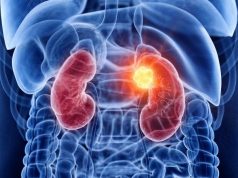Higher AUROC seen for 18-gene MPS2 model compared with current guideline-endorsed biomarkers
By Elana Gotkine HealthDay Reporter
MONDAY, April 22, 2024 (HealthDay News) — A new prostate cancer test has higher diagnostic accuracy for high-grade disease than current guideline-endorsed biomarkers, according to a study published online April 18 in JAMA Oncology.
Jeffrey J. Tosoian, M.D., M.P.H., from Vanderbilt University Medical Center in Nashville, Tennessee, and colleagues developed a multiplex urinary panel for high-grade prostate cancer and validated its external performance relative to current guideline-endorsed biomarkers. The new urinary test for high-grade prostate cancer modeled gene expression and clinical factors (18-gene MyProstateScore 2.0 [MPS2]). Optimal models were developed in parallel with and without prostate volume (MPS2+ and MPS2). The development cohort included 761 men and the validation cohort included 743 men (20.3 percent with high-grade prostate cancer on biopsy).
The researchers found that the area under the receiver operating characteristic curve values were 0.60 using prostate-specific antigen alone, 0.66 using the risk calculator, 0.77 using the Prostate Health Index, 0.76 and 0.72 using the derived multiplex 2- and 3-gene models, respectively, and 0.74 using the original 2-gene MPS model compared with 0.81 and 0.82 for the MPS2 and MPS2+ models, respectively. The MPS2 model would reduce unnecessary biopsies performed in the initial biopsy population (range, 35 to 42 percent for MPS2 versus 15 to 30 percent for other tests) and repeat biopsy population (range, 46 to 51 percent for MPS2 versus 9 to 21 percent for other tests) at 95 percent sensitivity.
“These findings suggest that use of the test in patients with elevated prostate-specific antigen levels can reduce the potential harms of prostate cancer screening while preserving its long-term benefits,” the authors write.
Several authors disclosed ties to the biopharmaceutical industry; several authors hold study-related patents.
Copyright © 2024 HealthDay. All rights reserved.








